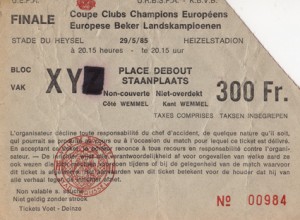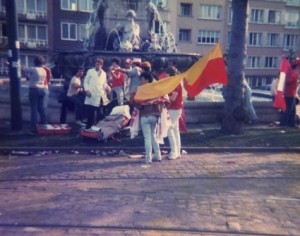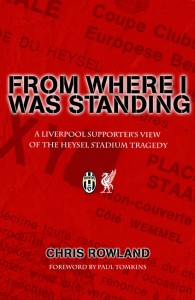The following is a free-to-read series of excerpts from Chris Rowland’s forthcoming book, “From Where I Was Standing: A Liverpool Supporter’s View of the Heysel Stadium Tragedy”. Chris, now in his mid-50s, has attended all of Liverpool’s last ten European finals. The book covers the travels of a motley crew of Reds to Brussels, before events took a tragic turn.
From Chapter 7
AT THE HEYSEL
* But on that perfect late spring evening, the Atomium rose majestically into the vivid blue sky, its metal glinting in the sun’s glare. In the foreground, the flags of the Heysel Stadium fluttered proudly in proclamation of its finest ever moment, the first time it had ever hosted the major European final –– and its last. No scene could have hinted less at the sordid, squalid show that was to follow.
* Suddenly, ahead of us, a group of supporters came clambering over the wall at the edge of Block Z, shouting and gesticulating. At first we assumed it was our lot trying to bunk in without tickets and being turned back. More and more appeared, swarming over the wall and charging down the bank towards us. But as they drew nearer, running maniacally towards us, it quickly became apparent they were not Liverpool supporters trying to get in but Juventus supporters getting out. And they were heading straight for us, at speed, maybe a hundred or more. When faced with a number of rival supporters charging at him, the average English football fan’s experience tells him they are not coming for his autograph.
* We felt an acute sense of disappointment at the standard of the venue; this stadium did not make it feel like European football’s grandest occasion. You expect to be impressed, awestruck by the sense of occasion; I thought back to the grandeur and pageant of the Stadio Olimpico in Rome, the inspiring first impressions and the explosion of sound and vision created by Liverpool’s army of fans. In stark contrast, the inglorious Heysel felt second-rate, squalid, shorn of style and class, and with feeble organisation to compound it.

* The Heysel Stadium, now brilliantly illuminated like a spaceship against the encircling black night, had suddenly become the centre of the world’s media attention. Outside in the darkness, helicopters buzzed angrily, their lights twinkling in the night sky, and sirens wailed. The thought that there could be ambulances heading for the city morgue chilled to the bone.
* Opinion is still divided about whether they should have played the match. If you think that a match could not possibly matter after such a horror, of course you’re right; it couldn’t, and it didn’t. But I believe that if the authorities got one decision right, it was this one. For a start, playing the match bought some time; about two hours’ worth, to be precise. Time to get more police and army into position, in the town centre and the main transport hubs, as well as in and around the ground. Time to think about how to handle what had already happened, and time to work out how to avoid the imminent conflagration of putting 50,000 rival fans onto the streets simultaneously, and how to get them out of Brussels and out of Belgium. Most of all, time for some of the thunderhead of tension to dissipate.
From Chapter 8
BACK IN OSTEND
* Where is the divide between individual innocence and collective responsibility? When you follow your club, do you do so as an individual, representing only yourself, or as a member of your immediate small group, accountable only for the eight of you (in our case), or are you a representative of the whole body of Liverpool supporters? I knew I was innocent, and I knew all our group was. I knew a huge majority of the Liverpool supporters were too. But I knew that a few beyond our group weren’t. How much responsibility does that mean you take on personally? Over the days and weeks to follow, this issue kept bubbling to the surface of the swirling emotional morass. The trouble is, you don’t have any precedent to guide you over something as enormous as this. There’s nothing to draw on to help you, to show you how you should think and feel and behave. You just have to make it up yourself, and it’s hard, really hard. If something amusing happens or is said, are you allowed to laugh? If someone sees you laughing, do they think ‘Look, these callous murderers aren’t even bothered!’ When is it OK to laugh again?

From Chapter 9
WELCOME HOME
* To someone who had actually been there, it felt maddeningly, infuriatingly mono-dimensional and incomplete. A complex concurrence of circumstances had been reduced to child-like simplicity, and I just couldn’t reconcile what I was reading with what I had experienced. Besides, taking a lecture on morality, ethics and standards of behaviour from Thatcher’s government (in my eyes a truly malevolent influence on the very fabric of British life) and its baying, sycophantic lackeys in the British press amounted to a greater dosage of hypocrisy than I could stomach. What gave these people the right to vilify me for being a Liverpool supporter who had been at Heysel yet committed no offence?
© Chris Rowland and Paul Tomkins, 2009
From Where I Was Standing is released on October 20th (all pre-release copies via my website are sold out). Pre-ordering with the below link will ensure that the wholesalers stock enough copies.
